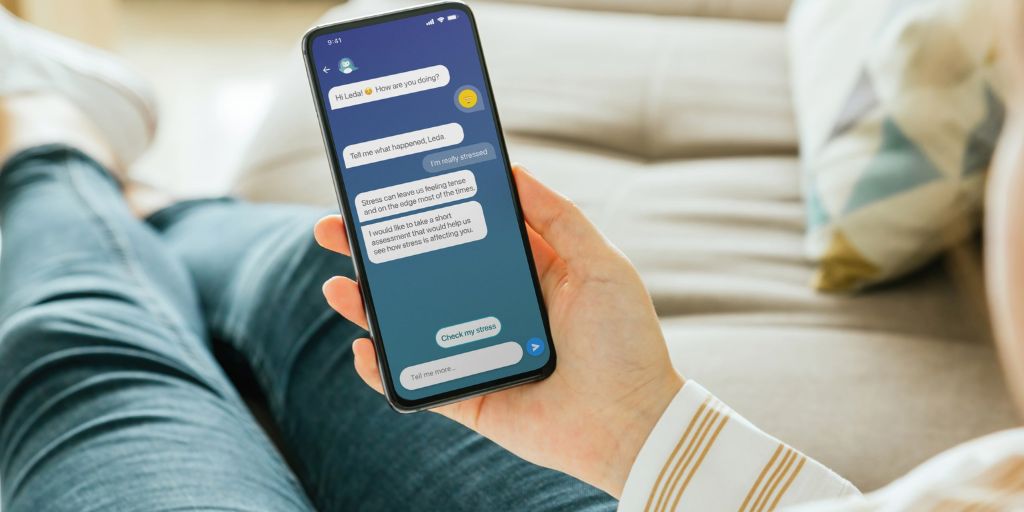
The need for sophisticated digital alternatives to conventional face-to-face therapy has been well established in recent years. If we go by the latest data for NHS talking therapy services, 1.76 million people were referred for treatment in 2022-23, while 1.22 million actually started working with a therapist in person.
While companies like BetterHelp are hoping to address some of the barriers that prevent people from seeking therapy, such as a dearth of trained practitioners in their area, or finding a therapist they can relate to, there is a concerning side to many of these platforms. Namely, what happens to the considerable amounts of deeply sensitive data they gather in the process? Moves are now under way in the UK to look at regulating these apps, and awareness of potential harm is growing.
Last year, the US Federal Trade Commission handed BetterHelp a $7.8m (£6.1m) fine after the agency found that it had deceived consumers and shared sensitive data with third parties for advertising purposes, despite promising to keep such information private. BetterHelp representatives did not respond to a request for comment from the Observer.
Instead of being an isolated exception, research suggests that such privacy violations are too common within the vast industry of mental health apps, which includes virtual therapy services, mood trackers, mental fitness coaches, digitised forms of cognitive behavioural therapy and chatbots.
Independent watchdogs such as the Mozilla Foundation, a global nonprofit that attempts to police the internet for bad actors, have identified platforms exploiting opaque regulatory grey areas to either share or sell sensitive personal information. When the foundation surveyed 32 leading mental health apps for a report last year, it found that 19 of them were failing to protect user privacy and security. “We found that too often, your personal, private mental health struggles were being monetised,” says Jen Caltrider, who directs Mozilla’s consumer privacy advocacy work.
Caltrider points out that in the US, the Health Insurance Portability and Accountability Act (HIPAA) protects the communications between a doctor and patient. However, she says, many users don’t realise that there are loopholes that digital platforms can use to circumvent HIPAA. “Sometimes you’re not talking to a licensed psychologist, sometimes you’re just talking to a trained coach and none of those conversations are going to be protected under health privacy law,” she says. “But also the metadata around that conversation – the fact that you use an app for OCD or eating disorders – can be used and shared for advertising and marketing. That’s something that a lot of people don’t necessarily want to be collected and used to target products towards them.”
Like many others who have researched this rapidly growing industry – the digital mental health apps market has been predicted to be worth $17.5bn (£13.8bn) by 2030 – Caltrider feels that tighter regulation and oversight of these many platforms, aimed at a particularly vulnerable segment of the population, is long overdue.
“The number of these apps exploded during the pandemic, and when we started doing our research, it was really sad because it seemed like many companies cared less about helping people and more about how they could capitalise on a gold rush of mental health issues,” she says. “As with a lot of things in the tech industry, it grew really rapidly, and privacy became an afterthought for some. We had a sense that maybe things weren’t going to be great but what we found was way worse than we expected.”
The push for regulation
Last year, the UK’s regulator, the Medicines and Healthcare products Regulatory Agency (MHRA) and the National Institute for Health and Care Excellence (Nice), began a three-year project, funded by the charity Wellcome, to explore how best to regulate digital mental health tools in the UK, as well as working with international partners to help drive consensus in digital mental health regulations globally.
Holly Coole, senior manager for digital mental health at the MHRA, explains that while data privacy is important, the main focus of the project is to achieve a consensus on the minimum standards for safety for these tools. “We are more focused on the efficacy and safety of these products because that’s our role as a regulator, to make sure that patient safety is at the forefront of any device that is classed as a medical device,” she says.
At the same time, more leaders within the mental health field are starting to call for stringent international guidelines to help assess whether a tool really has therapeutic benefit or not. “I’m actually quite excited and hopeful about this space, but we do need to understand, what does good look like for a digital therapeutic?” says Dr Thomas Insel, a neuroscientist and former director of the US National Institute of Mental Health.
Psychiatry experts agree that while the past decade has seen a vast proliferation of new mood-boosting tools, trackers and self-help apps, there has been little in the way of hard evidence to show that any of them actually help.
“I think the biggest risk is that a lot of the apps may be wasting people’s time and causing delays to get effective care,” says Dr John Torous, director of the digital psychiatry division at Beth Israel Deaconess Medical Center, Harvard Medical School.
The most worrying question is whether some apps could actually perpetuate harm


